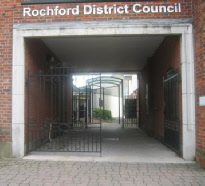Talk to Rochford Life on 0786 342 7294 or E-mail us. For numbers for shops, business etc. see page below.


Make a point of visiting us weekly! Tell a friend about us.

Local Government
Rochford District Council
Rochford District Council
To return to the Rochford District Council front page, please CLICK HERE
For Paul’s previous interview, CLICK HERE
For Page 1 of this Interview, CLICK HERE
For Page 2 of this Interview, CLICK HERE
For Paul’s previous interview, CLICK HERE
For Page 1 of this Interview, CLICK HERE
For Page 2 of this Interview, CLICK HERE
Talking to RDC’s Chief Executive, Paul Warren, prior to his retirement (Page 3 of 3)
(12th December 2013)
RL: But you’ve handled this financial reduction?
Paul: Yes, but the interesting juxtaposition for me has been the continuing public expectation which continues to increase. When people get their Council Tax bills they often write in asking why aren’t we doing this or that. Also we look at what complaints we get and what compliments we get and as an authority it’s encouraging to note that we get more compliments than complaints. We do regular reports to members on the Executive, on a quarterly basis and we’re quite sensitive and we try and learn from the complaints and compliments and monitor what is happening. One of the things here for me focuses on e-
RL: Have the public appreciated the fact of reduced financial resources?
Paul: I’m not sure that it’s hit home that there is much less money. Certainly for the County Council, the debate they’ve had around pot-
What you get for your money
RL: I think what you are saying is that because you have managed it so well, people aren’t aware of the cutbacks.
Paul: Yes, if you look at the average property in Rochford, a Band-
The more I think about it the more I think I’d be in favour of a local taxation system because you could probably have more debate and exposure around what you are getting for your money, and you could always offer people a choice: do you want your verges cut fifteen times a year and if you do that will cost you £X and that equates to that on the Council Tax, or are you happy to get away with ten cuts which will cost you £Y. We went through a period, which was not actually of our own making but it lead to some interesting learning exercises for us, when our grounds maintenance contractor went into liquidation. I remember the day well when I got the phone call and my immediate thought at that stage – because they did our cemeteries – have we got any burials today because we could have some problems! Suffice it to say we’ve been through a range of issues around developing a new grounds maintenance contract and getting the appropriate contractor in place.
RL: You mention verge cutting. Is grass cutting a big issue?
Paul: Well, we have gone through some interesting learning exercises around verge cutting because highway verges are a County Council function. This means they should be cutting them, but they pass it to us and they only give us enough money for one and a half cuts a year! This comes to about £30,000. Originally we were spending £200,000 on this so the members then have a debate, do we spend all this money on something that’s really not our responsibility but which looks nice, so we’ve been trying to work out what is the appropriate number of cuts for the money. When we’ve employed temporary contractors, or the weather hasn’t been good, or the cutting hasn’t been perfect, the number of complaints we’ve had has spiked through the roof. This comes back to public expectation which is high. So for members there is a dilemma, the cake is shrinking, and we have all these services, and so do you reduce services or reduce quality of some of them and so on? Meanwhile there are other functions that local authorities have been asked to pick up in different guises so other things are in the pot and need to be considered as part of the budget process. It is always a difficult debate for members with quite a lot of difficult decisions and over the next year, what is our immediate financial objective? We tend to look long term on our budget and we try to work on a 3-
Free Advice
RL: Are there things when you look back that have left you feeling frustrated?
Paul: A piece of advice I’ve always given to members, and sometimes they have agreed with it and sometimes they haven’t. The amount we get from Council Tax is, on average we’ve said, £205 and is relatively small amount, so even if we have a one or two percent increase in that, it doesn’t actually bring in a lot of money. If we freeze it for a year and we don’t get money in from another source to compensate for even that cost of living increase, that means that next year you are starting from a smaller base (but costs will have gone up), so any decision you make in one year will not just impact on that year but will impact on subsequent years. So, my advice to members is, if possible you should always try and increase your Council Tax year on year because if you stand still you are not just losing that year’s increase but you are losing subsequent years’ increases as well. At the present Government are offering Councils a grant subsidy to free Council Tax but those grants only tend to be for a fixed term period so if that’s not continued, you’ll then fall back to your original figure.
RL: You’ve said a couple of times, “I’ve said to members.” I recently ran across a young man thinking of running for the Council. With all of the wealth of knowledge and experience you’ve had from the years, what advice would you give to such a person coming in?
Paul: When all councillors are elected I make a point of meeting them and discussing with them what their aims and aspirations are, and to pick up basic protocols and procedures. What I would say is, if you want to get involved in the community, it’s certainly an interesting area to get involved and you’ll certainly be a lot more knowledgeable after a year or two. A piece of advice I give to all new members is don’t think you can address everything from the outset and focus initially on those areas you are interested in and you enjoy because the amount of information you will get as a councillor is vast. There is a temptation that you will try and cover all the bases and if you do that you will get extremely frustrated, annoyed and potentially disillusioned, and so you must build on a basis of knowledge and interest into someone who has, hopefully after three or four years, better understanding of the agenda, and knowledge of what the Council is all about.
RL: Have you given Amar advice as you hand over?
Paul: Oh yes, and my advice is that as Chief Executive you are dependent on a very positive working relationship between the organisation staff, management team and the members; it is a collective and all parts need to work and you’re in effect the glue between all the parts. Also remember that you’re in it for the marathon as opposed to the hundred metre dash, and you need to think, not just of what you are doing tomorrow but what you are doing in the next three to five years. Yes, and be good with communication because it’s like being the captain or the helmsman on the ship, you are steering the ship and you need to be clear about which direction you are going in, what speed you can do and so on. So far he seems to be really enjoying himself.
RL: What do you think are the big challenges that will face him in the next five years?
Paul: Oh I still think it is that announced by the Chancellor – less money to deliver services, so I think we are going to continue to look at ways we either reduce expenditure or increase income or a combination of both, and there are various things that feed into that – car park charges, toilet closures etc. – and also I think that now we’ve got the Core Strategy out and the allocations out, we will start to see how things will be developed across the District. We will still have to review the Core Strategy again to take it up to 2031 and as we’ve seen from the rather lengthy process we’ve been through to date, no one wants any development near them so there will continue to be a challenge between do we need development and, whether you like it or not, there is a demand for certain facilities, there is a demand for new housing and that will continue to remain a challenge in the sense of where is it all going to go?
RL: Well again, Paul thank you for a most comprehensive hour and a quarter! Thank you for educating us so well! Thank you for your time and your sharing and may we wish you a most happy and long retirement.
